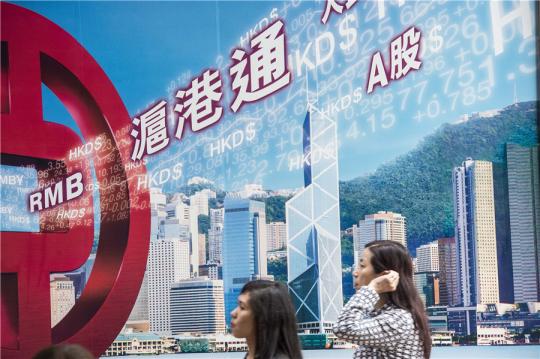HKEX chief: Stock Connects to widen investment options

Pedestrians walk past an advertisement for the Shanghai-Hong Kong stock connect program in Hong Kong's financial hub. (Photo/Xinhua)
Making shares of the Chinese mainland's tech giants listed in Hong Kong available to qualified mainland investors through the Stock Connect programs is something that is "on the horizon", according to Charles Li, chief executive of Hong Kong Exchanges and Clearing Ltd, the operator of the Hong Kong bourse.
Stock Connects are unique collaborations between the Hong Kong, Shanghai and Shenzhen bourses that allow international and Chinese mainland investors to trade securities in each other's markets through the trading and clearing facilities of their home exchange.
For mainland tech companies that have launched secondary listings in Hong Kong, such as Alibaba, NetEase and JD, the Hong Kong side of the issues regarding the inclusion of their shares in Stock Connect is very much resolved. HKEX is working with its partners in the mainland to ensure that their issues are being addressed, Li said during the Bloomberg Invest Global conference on Monday.
"They want to see some hope that some of those great companies will, one day, consider a domestic listing. I think that's one of the issues that we are working with them. But ultimately, everybody agrees that having a lot of the customers of many of these great companies to become their shareholders is (in) the common interest of all parties involved," he said.
"There are things we can do here in Hong Kong, including some of the changes in the system and the rules… They may or may not necessarily be sufficient for us to reach agreement with our friends in Beijing, Shanghai and Shenzhen, but I'm sure this is something that is on the horizon."
Earlier this year, the US Securities and Exchange Commission launched an investigation into Luckin Coffee Inc for fabricating its 2019 sales figures.
Nasdaq has notified the Chinese coffee chain of plans to delist it from the US stock exchange.
"We are going to see bad apples all the time … The key is to make sure the bad apples don't succeed and they don't really fool the regulator. In fact, in many ways, the bad apples are finding it's much harder to fool our regulator here (in Hong Kong) than in the US simply because of the distance, because of the lack of familiarity … So they are not coming here because they know they are going to be seen through very quickly here," Li said.
Speaking of the US government's push to increase scrutiny of US-listed Chinese companies, he said: "We don't want substandard companies to be listed in any market. We don't want them to be here if they are not able to qualify in the United States or if they are delisted because of those reasons … So from that perspective, all good companies will come back not because they are going to be deterred by the US legislation. But obviously, the less friendly environment and sentiment in the US are not helping them have a lot of confidence."
At this point, HKEX is seeing tremendous interest in terms of the issuers wanting to have a secondary listing, and some may eventually want to move to a primary listing. This year is going to be a big year for the stock exchange, not only because Chinese mainland tech firms are coming from the US and other markets back to Hong Kong, but also because a lot of big homegrown IPOs are coming up, he said.
"One thing people sometimes do not fully appreciate is that the markets (in the mainland and Hong Kong) are really mutually reinforcing and mutually helping each other ... We are very differentiated in our roles, our functions and our mutually complementary strengths," Li said.
Yi Huiman, chairman of the China Securities Regulatory Commission, said last week the top securities regulator will speed up efforts to include shares of companies listed on the Shanghai Stock Exchange's Science and Technology Innovation Board, or "STAR Market", in the Shanghai-Hong Kong Stock Connect.


